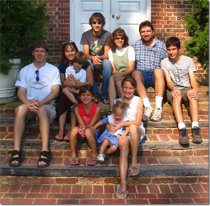Oceanus Hopkins had a rough start. His parents, fleeing persecution, crowded onto a ship with Pilgrims and others to head for a new land. Fighting seasickness, rotting food, and the effects of tight living-quarters, Oceanus’s mother gave birth aboard the Mayflower making him the 32nd child to join the 102 travelers going to Virginia to seek a new life. After a storm blew the ship off course, they landed in uncharted territory on the coast of Massachusetts. Though everyone knew life would be hard, few fully realized the trials they would face.
Some historians credit the ultimate survival of the colony to the number of children who went to the new world. Nearly half of those who sailed died that first winter, yet children had a higher survival rate than the adults. This added longevity to the colony. Hardy and hard-working—the children gathered food, helped build shelter, and learned survival techniques from the Wampanoag tribe which came to their aid. Oceanus Hopkins was born into this adventure, facing the trials of the new world head-on alongside the adults to create a new life.
This Thanksgiving, I have to admit that I am extremely thankful to live in a different time. I will put my children to bed in a warm shelter with their stomachs full of nutritious food. Should they become ill, our doctor will likely be able both to tell me what is wrong and provide treatment. Pilgrim parents could offer only rudimentary shelters and scant food. I feel so fortunate compared to them. Yet, I wonder, “Am I doing as well by my children as they did by theirs?”
Though the trials are very different, today’s families face the challenge of building a life in the unknown much as our Pilgrim forefathers did. Ever-changing technologies, financial upheaval, the inability of basic institutions to adequately serve their mission, and global interdependence force families to forge a new life in uncharted territory. Have we prepared our children as well as the Pilgrims prepared theirs?
Can our children work hard? The Pilgrim children weren’t assigned chores to simply fill a chart and earn a reward. Their efforts were critical to family survival. Whether firewood was handy or difficult, children must get it or freeze to death. Food was gathered—even if it took all day. Because our children’s efforts are more an act of training than integral to real accomplishment, it’s easy for us to let them off the hook when the going gets tough. Instead, we need to prepare our children to face difficulty, to persevere in the most difficult circumstances. Instead of letting them off the hook, we must find jobs that have real meaning and require our children to see them through to the end.
Can our children team with us? The Pilgrim children worked with their parents to establish their colony. They pooled skills, supported and encouraged each other, and sought together the new life they envisioned. Does your family work together toward goals? Do your children have the experience of combining their skills with yours to achieve a common vision? Some can work hard for personal benefit. Delaying gratification, persevering through hardship, and putting up with those less skilled all for the sake of achieving benefit for a larger group takes a a special kind of strength. Our children’s best preparation for this is teaming with us.
Can they learn from others? Have we taught our children to respect and listen to others so that they can learn from others? The Pilgrim children’s lives depended on their respect toward and willingness to listen to the Wampanoag—even when these tribal people were so different from anyone they had known. In this time of national interdependence time, our fates are intertwined with those of people around the globe. Do our children know how to respect and listen to those who are very different but have information to offer? We must instill a basic respect for others in our children so that they are able to build relationships with, gain from, and offer to these others in order to work together. Even in times of strong disagreement, this basic willingness to respect and listen can build alliances across differences that may mean our children’s very survival.
Do our children have a vision to carry them through the toughest times? Though there were many other travelers on the Mayflower, the Pilgrims came to this land dedicated to creating a land where God was worshipped biblically. They staked their very lives on this call. Their commitment to this vision enabled them to face and overcome hardship instead of giving in to despair. Do our children have a vision that will provide the focus and incentive to overcome any hardship they face?
Thanksgiving reminds us to be thankful of the privilege of living in this great country. As we pause to remember those who helped found our nation, may we also glean a few parenting strategies. May we ensure our children are strong enough to face hardship and skilled enough to overcome it. Instead of shielding them, may we work with them to create a vision for the future in which they actively participate and toward which they significantly contribute. In our intense gratitude for all those blessings our children enjoy, let us not substitute weakness for strength or passive reception of blessing for active involvement in creating blessing. Oceanus worked alongside his parents to lay the foundation of our nation. Perhaps, this Thanksgiving provides us the opportunity to explore with our children how we will work together to meet the challenges of today and build a heritage for which future generations will pause to give thanks.
This month’s topic: Which Pilgrim lesson do you wish your children to learn?
Labels: family issues, holidays

